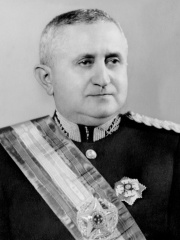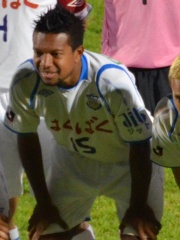 Cuiabá
Cuiabá
Cuiabá ranks 2,397th in number of biographies on Pantheon, behind Zakynthos, Castelfranco Veneto, and Castellammare di Stabia. The most famous people from Cuiabá are Eurico Gaspar Dutra, Beto, and Edivaldo Hermoza. Cuiabá has been the birth place of many soccer players, and politicians. Cuiabá is located in Brazil.
Cuiabá is the capital city and the largest city of the Brazilian state of Mato Grosso. It is located near the geographical centre of South America and also forms the metropolitan area of Mato Grosso, along with the neighbouring town of Várzea Grande. The city's name is an indigenous Bororo word meaning 'arrow-fishing', The city was founded in 1719, during the gold rush, and it has been the state capital since 1818. The city is a trading centre for an extensive cattle-raising and agricultural area. The capital is among the fastest-growing cities in Brazil, followed by the growth of agribusiness in Mato Grosso, despite the recession that is affecting Brazilian industries. Cuiabá was one of the host cities for the 2014 FIFA World Cup. Read more on Wikipedia
People
Between 1883 and 2001, Cuiabá was the birth place of 10 globally memorable people, including Eurico Gaspar Dutra, Beto, and Edivaldo Hermoza.
People Born in Cuiabá
Go to all RankingsEurico Gaspar Dutra
POLITICIAN
1883 - 1974
HPI: 63.70
Rank: 1
Beto
SOCCER PLAYER
1975 - Present
HPI: 52.37
Rank: 2
Edivaldo Hermoza
SOCCER PLAYER
1985 - Present
HPI: 50.27
Rank: 3
Hugo Alcântara
SOCCER PLAYER
1979 - Present
HPI: 46.10
Rank: 4
Igor Jesus
SOCCER PLAYER
2001 - Present
HPI: 43.40
Rank: 5
Geílson de Carvalho Soares
SOCCER PLAYER
1984 - Present
HPI: 42.04
Rank: 6
Marcos Aurélio
SOCCER PLAYER
1984 - Present
HPI: 40.65
Rank: 7
Paulinho
SOCCER PLAYER
1982 - Present
HPI: 38.35
Rank: 8
David Moura
WRESTLER
1987 - Present
HPI: 32.93
Rank: 9
Bruna Benites
SOCCER PLAYER
1985 - Present
HPI: 30.80
Rank: 10
Newly Added People Born in Cuiabá
Go to all RankingsOccupations
Most individuals born in present day Cuiabá were soccer players (8), politicians (1), and wrestlers (1), while most who died were .
Occupational Trends
Over the past 100 years, soccer players have been the top profession of globally memorable people born in Cuiabá, including Beto, Edivaldo Hermoza, and Hugo Alcântara. Whereas, throughout history, soccer players have been the profession with the most memorable people born in present day Cuiabá, including Beto, Edivaldo Hermoza, and Hugo Alcântara.
Places
Overlapping Lives
Below is a visual represetation of the lifespans of the top 1 globally memorable people born in Cuiabá since 1700.










